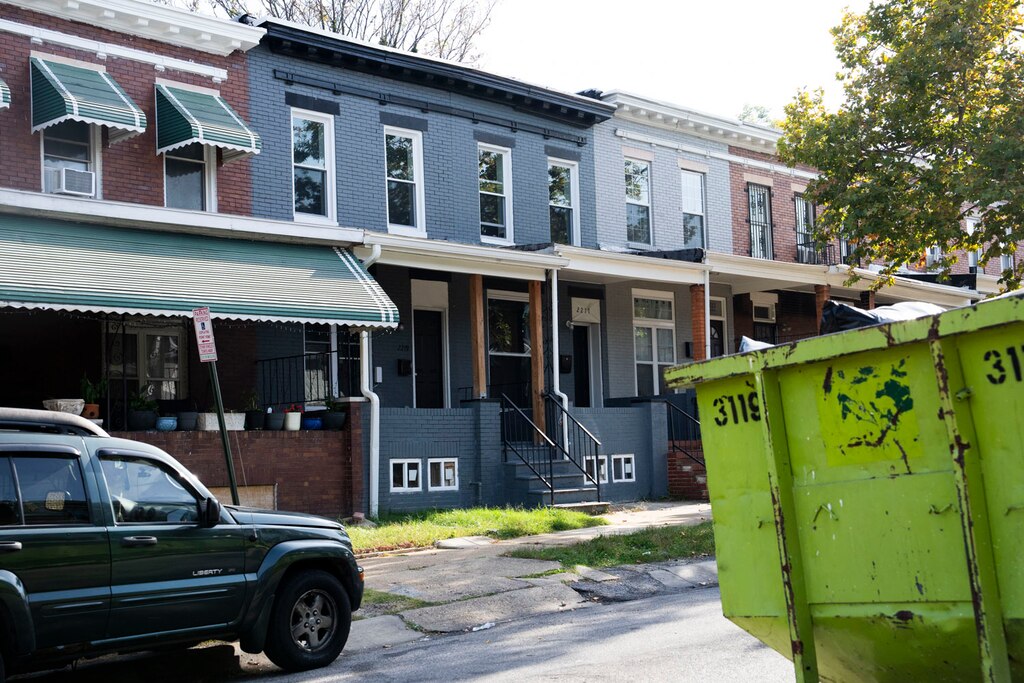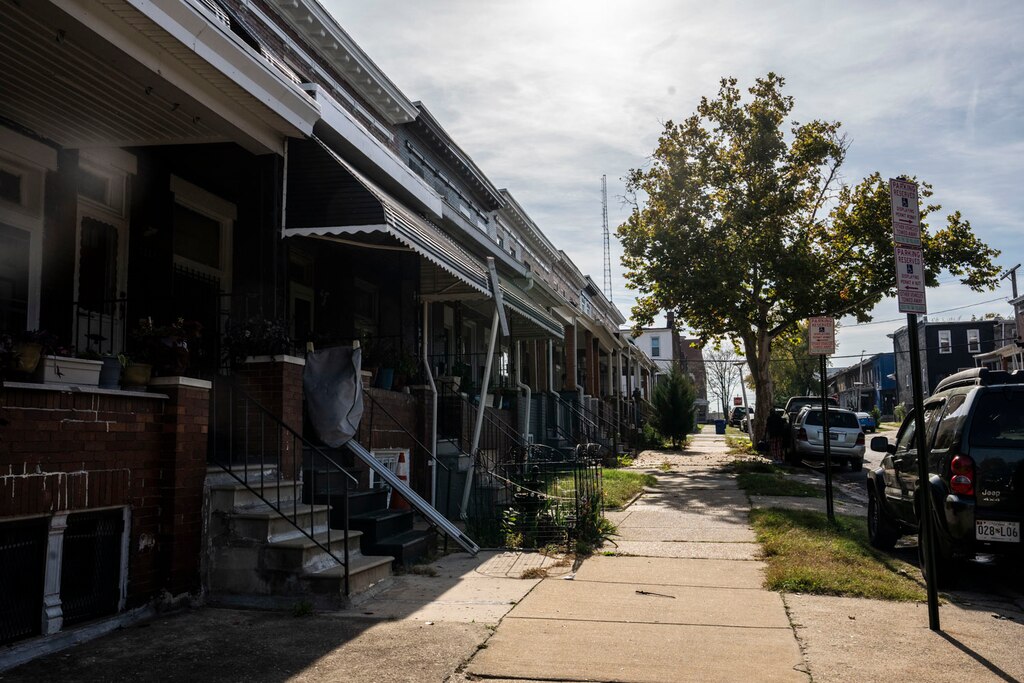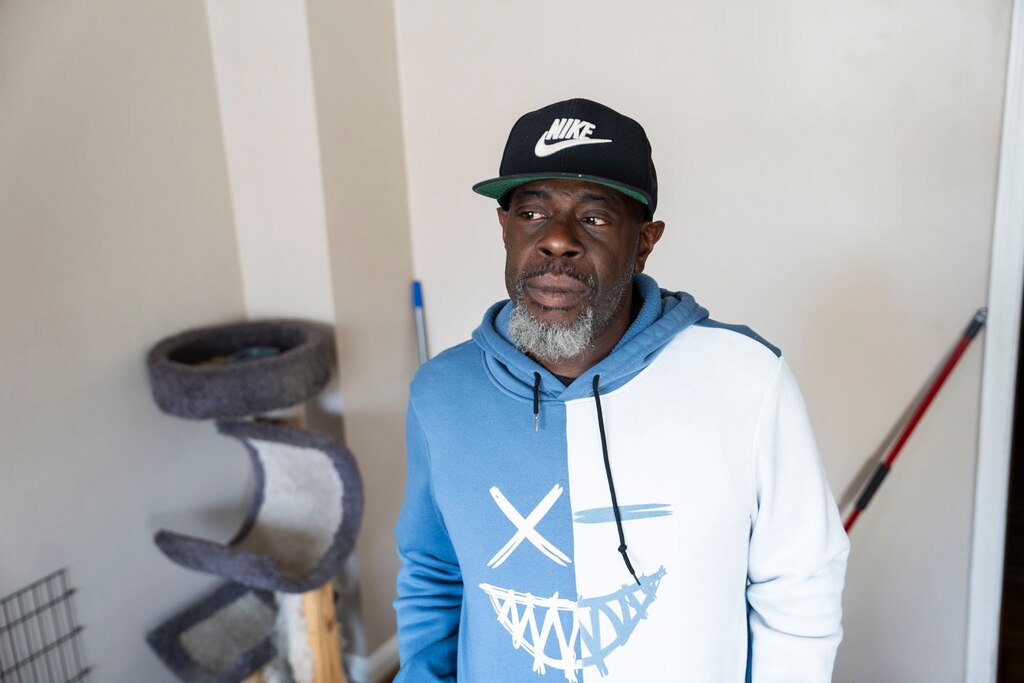When 5-year-old Zona Byrd was discovered unresponsive in bed last month, her mother, Bernice, didn’t call 911, according to court records. She called her sister.
The girl’s aunt soon arrived at the Byrds’ gray brick rowhouse in Northeast Baltimore, climbed the steps to the second floor, and entered the middle bedroom that Zona shared with her older brother.
She felt Zona’s hands and they were “ice cold,” according to a police report.
By all appearances, Zona had starved to death.
Her ribs were visible, and a detective who touched her body could not discern any muscle. She should have been in kindergarten, yet she was wearing toddler-sized clothing that hung off her skeletal frame.
In her parents’ bedroom, police found food stashed inside a locked closet inaccessible to Zona and her siblings, and her parents couldn’t say when they’d last fed Zona or seen her alive. Now, they’re facing first-degree murder and child abuse charges.
Zona weighed just 17½ pounds, a healthy weight for a 9-month-old baby. A girl her age should weigh twice that much.
It takes months for a child to starve to death — plenty of time for family, friends, neighbors, teachers or social workers to raise concerns. In Zona’s case, either no one knew, or no one did enough to save her.
But there were signs of trouble.
The Baltimore Banner thanks its sponsors. Become one.
Her brother was often seen rummaging for food in the trash at school, a prosecutor said during a court hearing. It’s unclear if that behavior was reported or investigated. A spokesperson for Baltimore City Public Schools declined to comment.
Her parents, Bernice Byrd, 32, and her husband, Gerald Byrd, 34, had previously harmed their children and lost custody, only to regain it, a prosecutor said in court. Social workers stopped visiting the family earlier this year, a law enforcement officer familiar with the case said.
Lilly Price, a spokesperson for the state Department of Human Services, the agency that oversees investigations of child abuse and neglect, declined to answer questions about the Byrd family. She said the division is bound by strict confidentiality laws meant to protect the privacy of children and their families.
“Our staff dedicate their careers to protecting children and ensuring their safety and wellbeing,” Price said. “The death of any child is an immeasurable loss felt deeply by everyone in the community and by all our staff.”
The number of child fatalities in Maryland due to suspected abuse or neglect has risen sharply in recent years, peaking in 2023 at about two per week, state data shows, and child safety advocates warn that Child Protective Services is swamped and understaffed.
Price disputed that characterization, saying the agency has reduced job vacancies and employees are encouraged to speak up when they feel overwhelmed.
Melissa Rothstein, a spokesperson for the state Office of the Public Defender, said the division represents Gerald Byrd and had no comment on the case. Attorney Phillip Corey Levin, who represents Bernice Byrd, said she will plead not guilty. He added that he plans to explore her competency to stand trial and her mental fitness at the time of the alleged offense.
Andre Cheeks, who lives next door to the Byrds and has children of his own, said if he had any idea Zona and her siblings were in danger, he would have fed and protected them. He said he thinks any neighbor on the block would have. He wonders if the Byrds were mentally ill. But he’s also haunted by an impossible question.
“What would cause a person to starve their own child?”
Signs of trouble
One recent Saturday morning, Cheeks said he was sipping coffee on his porch when Gerald Byrd stepped outside to do the same.
The Baltimore Banner thanks its sponsors. Become one.
The two men made small talk for a few minutes. Cheeks has lived on Aiken Street in the East Baltimore Midway neighborhood for most of his life, while Byrd and his young family were relative newcomers, staying in one of the many nearby homes that had been renovated and turned into rentals.
But their conversation was soon drowned out by Byrd’s gray and white pit bull, who kept running up to an open window and barking. Cheeks said he had never seen the dog so agitated.
Now he wonders if the animal was trying to tell him that something inside the house was horribly wrong. Police discovered Zona’s body two days later.
About a week before Zona’s death, Cheeks recalls seeing a woman Bernice Byrd identified as her sister arrive with dozens of bags of groceries. The women had gone shopping together, and Byrd seemed pleased with the haul. He remembers her boasting about how much money they’d spent and how much meat they’d brought home.

When police searched the Byrds’ home for food, they found nothing in the kitchen cabinets, a salad in the refrigerator and a freezer full of meat, perhaps from the grocery run Cheeks described. Then they discovered several nonperishable food items behind a locked closet door in the Byrds’ bedroom.
The Baltimore Banner thanks its sponsors. Become one.
Zona wasn’t the only member of the family starving, according to court records.
Her 6-year-old brother was barely able to stand or walk, police said. Doctors at Johns Hopkins Hospital found he was severely malnourished and only weighed 35 pounds. A healthy weight for a boy that age is up to 60 pounds. He was hospitalized and fed through a feeding tube for several days after Zona was found, a prosecutor said.
“Bernice Byrd and Gerald Byrd Sr. had a responsibility to provide for the basic needs of their daughter Zona Byrd and their son,” the charging documents state. “But neither parent provided adequate nutrition for either of these children despite their ability to do so based on the presence of food in the freezer and the locked closet in the bedroom.”
Bernice Byrd told a pretrial services investigator she suffers from depression and bipolar disorder. She told police she had been asleep most of the weekend before she found Zona’s body, a prosecutor said. And she claimed that it was her 9-year-old daughter’s responsibility to feed her younger siblings, ages 6, 5 and 2. They also have a 7-year-old sister who lives with their grandmother in Georgia, and an older sister who just turned 18 and had been living with their aunt, Anita Clay.
Several of Zona’s surviving siblings are now living with Clay, a prosecutor said. She could not be reached for comment.
The Baltimore Banner thanks its sponsors. Become one.
When Cheeks last saw the Byrd children a few months ago, Zona’s hair was neatly braided, and they all looked healthy, he recalled. They weren’t “go outside and play” kids, he said. He saw them most often in the mornings as he was heading to work and Gerald was walking the older children to school.
Thinking back now, when summer turned to fall, he didn’t notice those walks to school resume.
Spike in child fatalities
Child Protective Services has been investigating a growing number of deaths statewide due to suspected abuse or neglect.
The state agency examined 61 child fatalities in 2021, 74 in 2022 and 116 in 2023, according to data it shared with The Banner. As of July, the agency had probed 36 deaths so far this year. Those figures include sleep-related deaths of infants, which spiked in the Baltimore area in early 2023, and some investigations determined the children who died had not been maltreated.
“Child fatalities and serious physical injuries are the most tragic consequences of child maltreatment,” said Price, the state Department of Human Services spokesperson.
Paul Griffin, the legal director of Child Justice Inc., a nonprofit that litigates custody cases involving domestic violence and child abuse in Maryland, said he sympathizes with case workers who are doing their best, but thinks the agency needs substantially more staff and state funding to protect children effectively.
“I don’t think there is an agency in Maryland or any other state that is more overworked, overburdened, under-resourced and underappreciated than CPS,” he said.
The agency’s abuse and neglect investigations typically begin when concerned family members or mandated reporters — like teachers and health care providers — notice something wrong, Griffin said. The volume of work is staggering. In fiscal year 2021, the agency completed 20,547 investigations, or more than 50 per day on average, according to a Child Protective Services presentation provided by Griffin.
If officials substantiate an allegation, they usually work with the family to create a parenting plan, he added.
But if investigators believe the threat is severe enough, a judge could deem the child “in need of assistance,” resulting in the child’s removal from the home. These children are typically placed with family members or in foster care, although the goal is always to reunite them with their parent or legal guardian.

For a child suffering from abuse or neglect to become so malnourished she appears gaunt is “exceedingly rare,” said Dr. Howard Dubowitz, a professor of pediatrics and director of the Center for Families at the University of Maryland School of Medicine in Baltimore.
It would take months for a child to become as emaciated as Zona was before her death, said Dubowitz, who did not treat Zona.
He called for the state Child Fatality Review team to examine what happened to Zona and expose any shortcomings in the government’s response that contributed to her death. The team’s findings get reported to the governor, the General Assembly and the public.
Mostly, the pediatrician wants to know who outside the Byrd household noticed Zona’s condition deteriorate, and whether they reported it.
“How bad do things have to be before someone who knows, maybe loves, this kid does something?” Dubowitz said.
Violent incident
In November 2019, a social worker did report when Bernice Byrd’s oldest daughter showed up to school with a black eye, court records show. The girl, who was 13 at the time, said her parents were responsible.
The girl told a Child Protective Services investigator her mother took away her cellphone and smacked her as punishment for not cleaning her room. She said she fled to her bedroom and locked the door, but Gerald Byrd forced his way in and tried to stab her.
When he dropped the knife, she said he punched her in the face multiple times. Then he picked it up and tried to stab her again, the girl said. This time, she said she dropped to the ground and he kicked her.
Bernice Byrd had tried to stop her husband from stabbing her daughter, but right after the altercation ended, she kicked the girl out of the house, the teen told the investigator.
Her baby sister Zona was 4 months old at the time.
The family had been living in a rowhouse in Allendale, and the girl went to stay with Clay, her aunt who later took custody of her, court records show.
The girl, who recently turned 18, could not be reached for comment.
The Byrds were charged as co-defendants in the girl’s assault, but the COVID-19 pandemic derailed the trial. Prosecutors dropped the assault charge against Bernice and reached a plea agreement with Gerald. He received a five-year sentence with all but five days suspended and two years of probation.
Price, the state Department of Human Services spokesperson, would not say whether the Byrds received any assistance or monitoring following the 2019 case, although court records show a judge ordered Gerald to enroll in a job training program. The prosecutor who said the Byrds lost custody of their children didn’t say when they were removed or returned.
The Byrds’ neighbors in Northeast Baltimore recalled a time last school year that raised alarms about the family.
Cheeks and another man said Bernice told them the principal at Cecil Elementary School expressed concern about one of the children and reported suspected abuse. Bernice thought the principal’s concerns were unfounded, they said, and subsequently enrolled the children in another school. Spokespeople for the state Department of Health and Human Services and the city school district declined to comment on whether such a report was made. The principal, Aleesha Manning, declined to comment.
‘I can’t make sense of it ‘til I speak with him’
When James Gasque saw the news break last month about Zona’s death and her parents’ arrests, he was stunned. He’s known Gerald Byrd for 20 years and loves him like a son.
The two men met when they both lived on Walker Avenue in Idlewood. At the time, Gasque was raising his children, and Byrd was growing up in foster care.
Several months have passed since Gasque last saw the Byrd children, who call him Pop-Pop, but he said he speaks with Byrd regularly and never imagined the kids were in danger. In fact, he and Byrd spoke over the phone the day before Zona’s body was discovered, and the children passed the phone around.
“If I’d known what was going on, they’d have been here with me,” Gasque said.
Now, he’s struggling to accept an outcome — Byrd’s alleged involvement in his own daughter’s death — that feels impossible to believe.
“I want to talk to him. I want to hear it from him,” Gasque said. “I can’t make sense of it ‘til I speak with him.”

Another former neighbor from Walker Avenue, who requested anonymity because of the sensitive nature of the case, said Byrd suffered his own abuse as a child. Soon after Byrd’s foster mother adopted him, a man beat them, said the neighbor, who would intervene to protect them.
The neighbor said he and his wife also fed Gerald when he told them he wasn’t getting enough to eat at home.
Byrd occasionally returned to his old neighborhood to visit after he moved away and started a family. But his former neighbors said they had no idea he’d been charged with child abuse and assault five years ago.
“If that happened, how was he allowed around children?” the neighbor asked. “Where was the social worker making sure everyone was safe?”
Gasque said the Byrds had to participate in counseling and take classes on parenting and anger management to regain custody of their children. He pointed to that programming and Gerald’s pattern of walking his children to school after working overnight at the Amazon warehouse in Sparrows Point as evidence of his commitment to his family.
The last time Gasque saw the Byrd children was a few months ago at their home on Aiken Street. Byrd had invited him over for dinner. The kids were playing video games and bouncing around the house, jumping on the beds and couches. Zona, he recalls, was running around with her brothers.
“Whatever they did, she did,” Gasque said.
Kind neighbors
A man who lives a few doors down from the Byrds was fixing his roof the morning Zona’s mother couldn’t rouse her.
He was at the store when his wife called to tell him their block was teeming with cops.
When he returned, the man, who asked to remain anonymous because of the sensitive nature of the case, noticed the distinctive vehicle the city uses to transport dead bodies from a crime scene.
He watched as first responders carried a body bag out on a stretcher. It looked small, far too small to a hold a child’s remains.
And yet, they were carrying Zona.
“We are kind neighbors,” the man said. “We’ve got food, we’ve got grills, we understand.”
“Why didn’t they ask us for help?”
Baltimore Banner reporters Justin Fenton and Meredith Cohn contributed to this article.
How you can help
If you suspect that a child is being harmed, call 1-800-91PREVENT (1-800-917-7383). Maryland's Department of Human Services runs this 24/7 hotline. Reporting your concern may protect a child and help a family receive the resources and assistance they need.



Comments
Welcome to The Banner's subscriber-only commenting community. Please review our community guidelines.